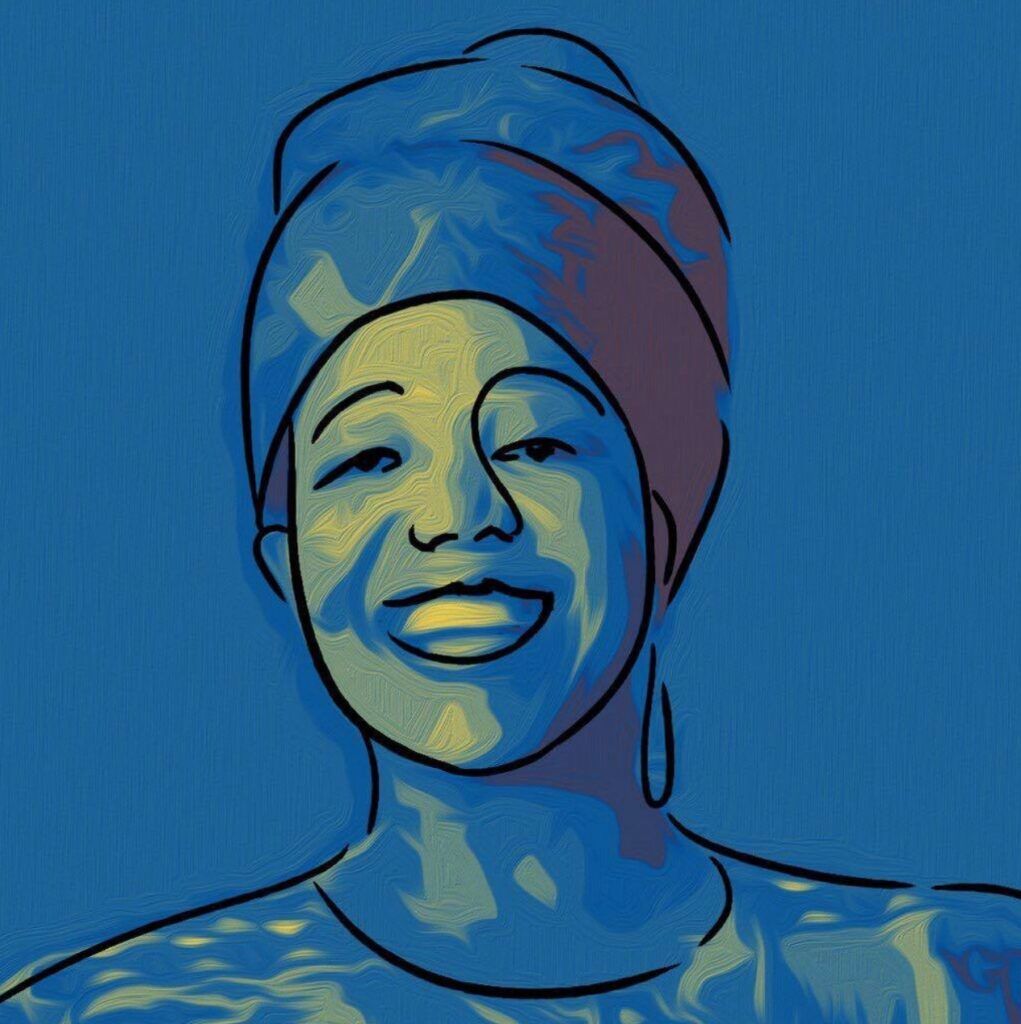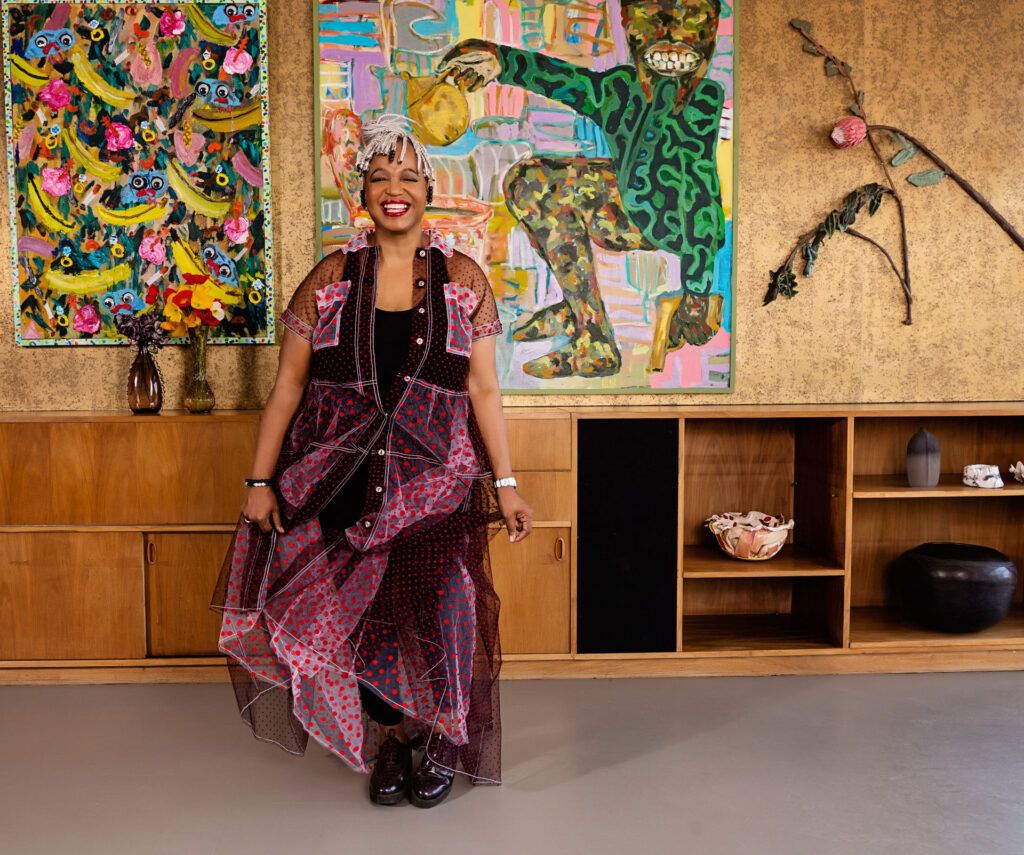BRENDA SISANE
How I fell in love with music

Like most people, I could start by saying I was born into a musical family. I would not be lying, given that my grandfather used to play the saxophone in a jazz band while they lived in Sophia Town, given that both my father and later on my step father were jazz album collectors. I can also say that I grew up surrounded by music. My neighborhood was alive with music, my formative years and the relationships within were imbued with music.
I was exposed to a variety of music styles. My early recollection of being surrounded by music started in my grandparents’ home where I was brought up. Our neighbours belonged to the African Apoostolic Chuch. They wore blue or green and white regalia, and met every Thursday evening after work and on Saturdays they would sing and chant all night. We grew accustomed to the drumbeat and singing, knowing most of the songs by heart. Often we went to visit the kids of this home where we were able to see the congregating members shuffling rhythmically in circles, the men making sounds while the women clapped in equal rhythm. The movements they made were well timed to the beat of the drum and the voices. Any young person in the neighborhood could make those sounds, do the moves and sing the lyrics of those songs. Often these scenes would be re-enacted when we “played house” a term for the pretend games children play.
Next door to the African Apostolic Church house, the drumbeat was a constant. At certain hours of the day a drum or a series of drums could be heard, and often from evening into early hours of the morning. The lady of the house was a Sangoma and she would train her initiates in this home. Here the vibe was a bit different in that there were regular rituals that we were exposed to as friends to the children of this home. Through our friends, we learnt how to behave at these ceremonies. Again costumes are part of the ritual, this time crimson red cloths, red and white beads, face paint, feathers and various forms of arm, ankle and head adornments were part of the rich scenery. We knew the dances, the songs as well as the behaviors each of the occasions commanded. Most of it was in quiet observation with respect to the spiritual realm within these events. I guess the ability to listen was borne out of these moments.
A few houses away we had another group of friends who like our family, were members of the Catholic Church. On Saturdays mornings, we would attend class to learn the catechism. Hymns of various services and scripts were taught. On Sunday mornings we would walk to church where the church choir would sing during service and the congregation would sing along in Latin, isiZulu and SeSotho.
Monday to Friday mornings at school assembly were no different. Accordingly with the school philosophy and the vernacular, in my insistence it was Xitsonga. We did not only learn the language but also about great composers and choirs from the region, imbibing literature of these music masters and their heritage as part of our extra curricular activity. Stories about revered academic institutions such as Tivumbeni College of Education, its legion of educators and the renowned choirs from these were celebrated. The sermons at assembly comprised of singing, and motivational speaking.
My brother belonged to the boy’s choir. Me on the other hand never made good from the trials for the girl’s choir. My dyslexia (this in retrospect since we did not know I had it at the time) and a limited vocal talent killed my chances to join any choir. I have to say as an admirer of my older brother I first fell in love with male vocals after he joined the choir.
Post primary school, I had the privilege of attending a school where we would be lectured about the political climate, the freedom charter and similar subjects of human rights. Here the songs would often be about freedom. My grandfather on the other hand, was long relegated to being a tailor working from home, had abandoned the saxophone after the forced removals out of Sophia Town to Meadowlands. The bug had not left him though because we grew up a singing family. On weekends when the adults were relaxing, on birthdays and during special occasions, my grandfather would take out his recorder and have us sing and improvise whichever way we wanted. We were fascinated by the playback.
We also had the radio. African language stations, newly emerging pop stations like Radio 5, Radio 702, Capital Radio, Radio Bop and so on. It was during this time as a teenager that I started to attend places of cultural learning such as community halls etc., although my grandparents would curtail these for worry about our safety out there. Naturally this age meant one was now beginning to determine one’s personal taste. This is the period when I was invited to join a listening club comprising of girls my age 15 -17. We would gather at each other’s homes during school holidays when the parents were at work, and play records to one another. This is where we learnt to move between the Jazz Ministers, Abdullah, Makeba, Belafonte, Tabane, Mbulu, Aretha, Sakhile, all in one day and be perfectly at home through it all.
It is these diverse influences that represent my seamless journey into the world of music. Way before I was a young adult, the soundtrack of my life was eclectic and nuanced by folk and tradition sounds and continued to evolve as I got older. When I started working on the radio I had already established the connection between music and my work environment in leisure and tourism. I worked in the PR Department for a hotel chain and I was able to create relationships with local radio stations, which ultimately led me to be spotted by Edgar Dikgole, a radio veteran who ran the programming for Radio Bop.
My radio interest has always been to share these stories about how music lives in our DNA and how society should continue to use music as a cultural tool for self development and self nurturing. Music is freedom.
Going back to my story of dyslexia. I discovered that through music, my inability to remember detail which led to major insecurities as I grew up were helped by my relationship with music. I was able to find my niche and thusly a professional pathway. Through music I was able to carve a career that I love. I remain a student of music always fascinated by its impact on our past, present and future.
